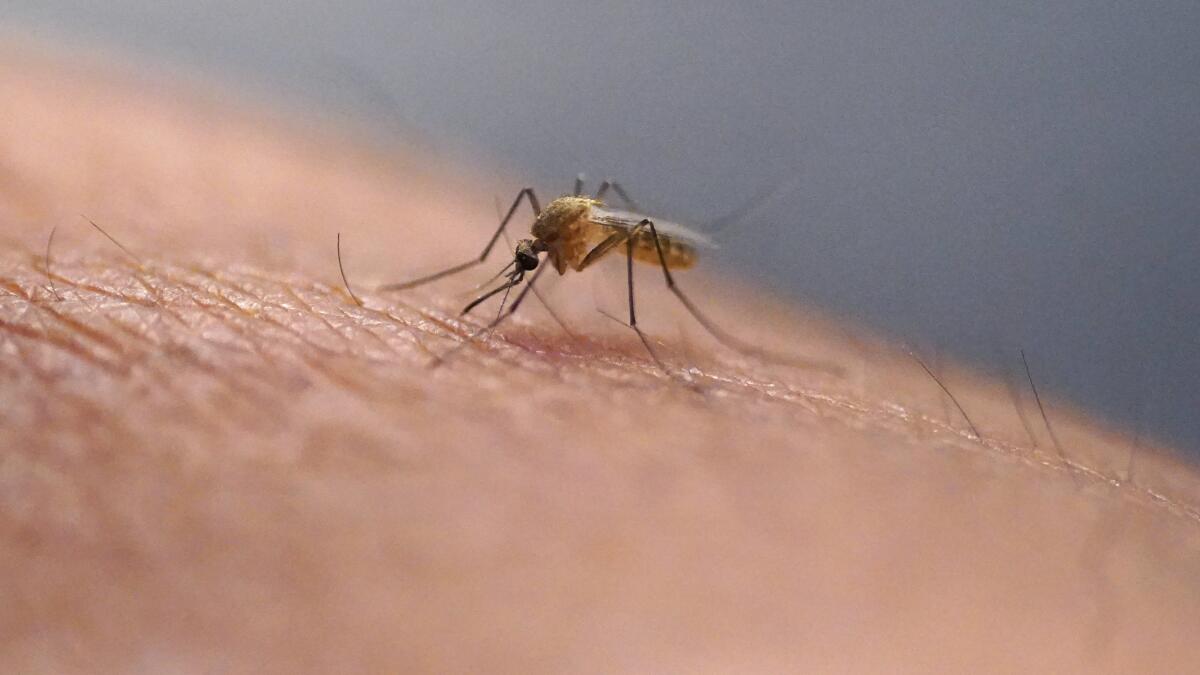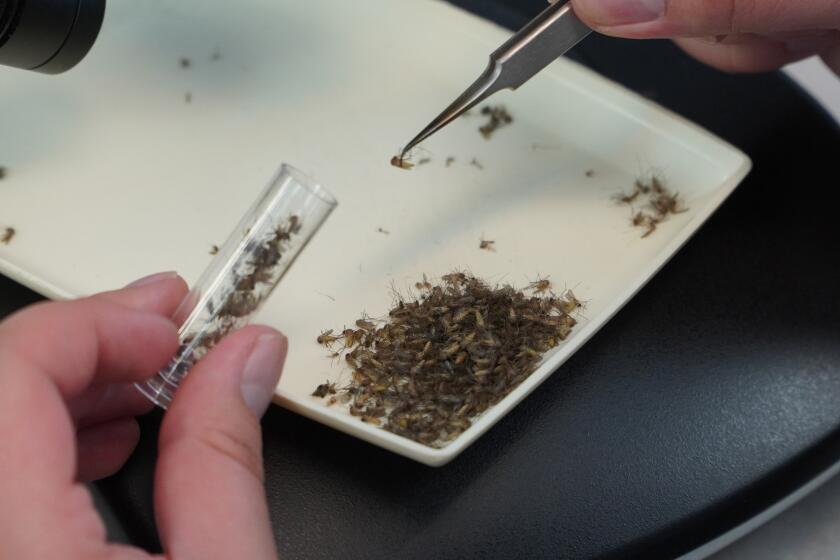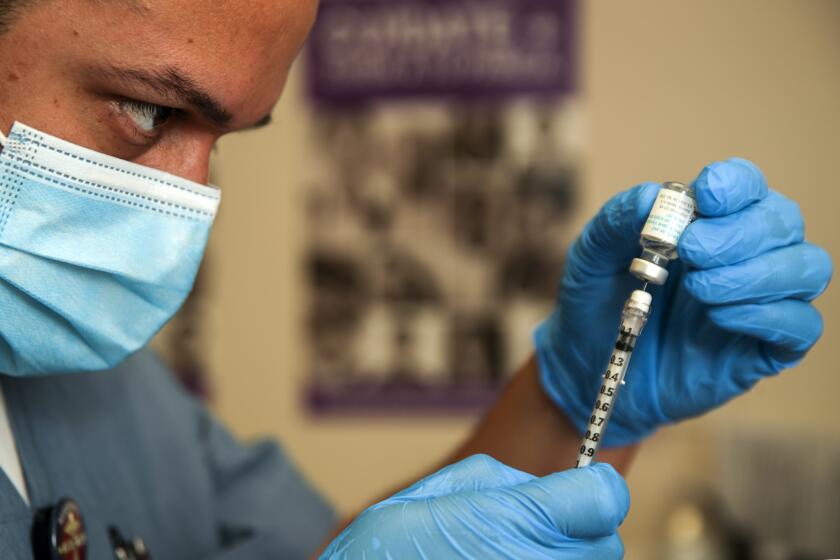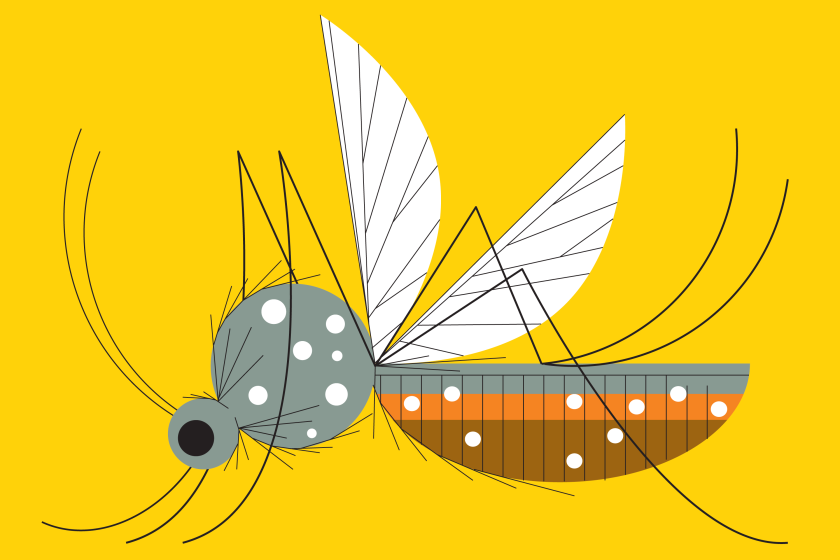First mosquito-related West Nile virus death in years reported in the Bay Area

- Share via
The first mosquito-related death in the Bay Area and the detection of mosquitoes carrying West Nile virus in Southern California underscore the risk Californians face as they spend more time outdoors this summer.
But experts say there are simple preventative steps people can take to reduce the chances of being bitten and infected by the virus.
On July 16, a man who lived in the eastern part of Contra Costa County died from a West Nile virus infection, according to the county’s public health department. It is the first reported West Nile virus death in the county since 2006.
Contra Costa Health’s communicable disease program is investigating the case and has not determined where the person became infected, according to a news release. The agency is not releasing further details about the case to “preserve medical privacy.”
Evidence of the West Nile virus has been detected recently in the same region. The Contra Costa Mosquito and Vector Control District found a dead bird and five chickens that had tested positive for the virus, all in the city of Oakley.
West Nile virus is transmitted to birds through the bite of an infected mosquito; a mosquito that feeds on an infected bird can then become infected with the virus. An infected mosquito can spread the virus to a human or another animal.
Mosquito season has arrived in Southern California, along with the threat that these insects could carry a number of dangerous diseases.
The infection can be dangerous to humans, with symptoms such as a fever, headache, vomiting and rashing.
Two human cases of West Nile virus disease were reported in Fresno and Yuba counties, according to the weekly California Arbovirus Surveillance Bulletin, prepared by the state Department of Public Health. In addition, three blood donors were reported as testing positive for West Nile virus in Fresno County, though they were asymptomatic.
On July 26 alone, a total of 140 new West Nile virus-positive mosquito pools were reported from 21 counties, including Los Angeles, Orange, Placer, Riverside, San Bernardino, Santa Clara, and Yuba. So far in 2024, 583 West Nile virus-positive pools have been found in 24 counties.
Last month, Los Angeles County reported mosquitoes carrying the virus were recovered from a trap in the Winnetka neighborhood of the San Fernando Valley.
In a statement, the Greater Los Angeles County Vector Control District said West Nile virus in the community isn’t unusual but “this early detection serves as a critical reminder for all residents to take preventative actions.”
What attracts mosquitoes
According to the American Mosquito Control Assn., 30 types of mosquitoes call the United States home. While there are differences among them — for example, some feed during the day and others at night — they share a life cycle that is dependent on water in which to breed.
Six types of mosquitoes are found in California, but only the Culex mosquito can carry West Nile virus.
Vector control agencies try to eliminate public breeding sites in gutters, underground storm drains, flood control channels and debris basins. However, mosquito control is a shared responsibility and residents need to do their part by eliminating potential breeding sites around their homes.
Start by identifying items on your property that can hold standing water, which when left untouched for at least seven days is a magnet for mosquitoes. Typical sites include birdbaths, old tires, clogged gutters, portable basketball hoops, uncovered outdoor grills, potted plants with saucers and flower vases.
Los Angeles County reported 10 cases of mpox in a two-week period, up from prior weeks. Officials call for testing and vaccination to help curb its spread.
Stagnant water that also contains leaves, soil or grass clippings supports mosquito development, according to the American Mosquito Control Assn.
Eliminate these breeding sites by draining or dumping the water, then block more from collecting. For example, turn over a rain-filled bucket or cover your grill. Do this at least once a week.
How to get the mosquitoes to buzz off
The Greater Los Angeles County Vector Control District suggests residents apply EPA-registered insect repellent with one of these active ingredients: DEET, picaridin, IR3535 (the trade name for ethyl butylacetylaminopropionate), para-menthane-diol, 2-undecanone (a plant-derived ingredient) or oil of lemon eucalyptus.
The Centers for Disease Control and Prevention advises against spraying repellent under your clothing. The agency also suggests that if you’re using sunscreen, to apply sunscreen first and insect repellent second.
Alternatives to chemical-based sprays or creams include repellents with plant-based ingredients such as citronella, lavender and peppermint. The American Mosquito Control Assn. said these ingredients are less effective than their synthetic counterparts, but they can work for people who don’t attract too many mosquitoes.
You can also try to make your outdoor recreation area inhospitable to mosquitoes by setting up several tiki torches or other devices that diffuse repellent. But the efficacy of diffusers can vary, depending on the species of mosquito.
For example, the Greater Los Angeles County Vector Control District says citronella candles are effective at repelling mosquitoes only in the immediate radius around the candle, and only in the absence of a breeze. It goes on to say that Aedes mosquitoes prefer ankles, so the candles that are typically placed on tabletops won’t provide much protection.
Everything you need to know to protect yourself from mosquitos while hiking and camping in Southern California.
Certain plants can offer some level of protection to your patio too. These include citronella and a few other geranium varieties, marigolds, lemongrass, catnip, certain types of mint, lavender and lantana. Some common aromatic herbs have the limited ability to drive off mosquitoes, such as rosemary, garlic, basil, thyme and fennel.
Try them one at a time until you find an approach that works best for you.
If mosquitoes manage to bite you despite all these precautions, don’t scratch. Scratching can cause secondary infection and prolong the irritation. In extreme cases, scratched bites can leave scars.
An anti-itch cream is typically all you’ll need to alleviate the discomfort. If you’re highly allergic to mosquitoes, the American Mosquito Control Assn. said you may need a cream with Benadryl or a similar antihistamine.
More to Read
Sign up for Essential California
The most important California stories and recommendations in your inbox every morning.
You may occasionally receive promotional content from the Los Angeles Times.














